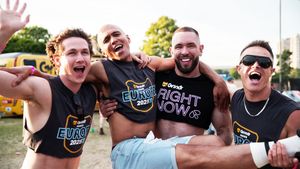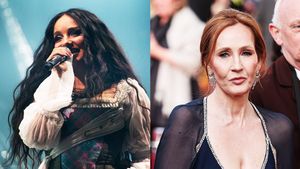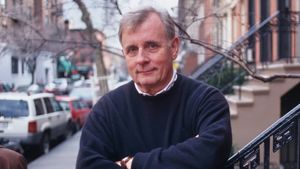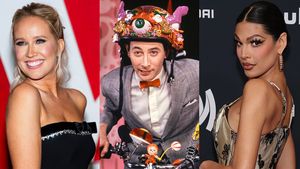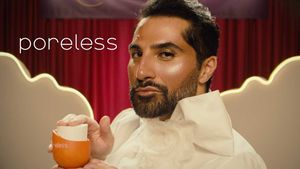It had been a bad
day for Simone Sneed. The "I like you" note
she had given Tori, her very first crush, had been
passed around to her entire eighth-grade class.
Everyone knew, and worse yet, Tori had told Simone off
during a very public spat in the cafeteria.
"I'm not gay," she exclaimed.
"That's gross!"
Simone's mother, Jennifer, had never
raised her to think there was anything remotely wrong
with being gay. That night she visited her
mother--who was recovering from a
hysterectomy--in the hospital and came out of
the closet. "She was drugged," Simone
remembers, "so she just said,
'That's OK, I still love you.' And then
she fell asleep."
Simone was 13 and out. "My mom is just
amazing," she says. "While she was
raising me she was working full-time for the state education
department and getting her Ph.D. in education
administration, and she was so grateful about all of
it. Like, 'Oh, yeah, this is no big deal. Everyone
raises their kid, goes to school full-time, and works
full-time. No biggie.' "
Soon after her daughter came out, Jennifer Sneed
jumped on the Internet and found Pride for Youth, a
gay youth coffeehouse on New York's Long Island
that meets every Friday night, and it immediately became
part of Simone's weekend routine. She met her
first girlfriend there, Mari, who suggested one day,
somewhat innocently, that they should have a
sleepover. When Simone brought up the idea, her mom asked if
she and Mari were just friends or something more.
"Um, something more," Simone answered.
Jennifer eyed her daughter, who was entering her
teenage years wide-eyed and vulnerable like any other
13-year-old. "OK, then Mari should sleep in the
guest room." The next morning, while Jennifer and her
husband were out on their regular morning walk, Simone
enjoyed her first make-out session on the family room couch.
Today, friends and strangers alike marvel to
Sneed that she was out so young, but at the time she
had only the vaguest understanding that she was
blazing onto the road far less traveled.
By high school, however, it became clear to
Sneed just how much she stuck out. "Black,
overweight, loud, and smart--I was a very strange
kid," she says. She wore out-and-proud gay pins
to class and talked up gay issues whenever the
opportunity arose, and she paid for it with nasty ridicule,
such as kids spitting on her backpack and taunting her at
the bus stop. Even the other out gay kids in school
steered clear of Simone, lest they be branded
super-gay by association.
Sneed was
insightful enough to realize that the only way she was going
to feel comfortable inside her school was to form a
gay-straight alliance, so at 15 she founded PRISM, or
People Respecting Individualities, Similarities, and
Minorities--a name concocted by Simone to specifically
avoid the direct in-your-face quality of a name that
included the words gay-straight alliance.
The group still exists, but by the end of her
sophomore year, Simone was done with the pettiness of
high school and graduated early, at 16. She entered
the State University of New York at Albany. "I felt
like I was part of gay America," she says.
"I had a girlfriend. I was involved with gay
groups on campus. I went to New York City pride."
Then Fred Hampton Jr., the son of a Black
Panther leader slain in an infamous 1969 Chicago
police raid, spoke on campus and triggered a racial
awakening in Simone. Her stepfather is white, she was raised
in the white suburbs, her speech patterns sounded
stereotypically white, she was dating a white girl at
the time, and all her gay friends were white. The
realization of this disconnect surprised Simone in how much
it unsettled her identity. She felt forced to decide
whether she was black or queer (the latter with which
she now identifies also), a dilemma she refused to
reconcile at the time.
"We live in a culture that forces people
to parcel out who we are," she says. "I
need a culture that accepts me for all that I am."
When she attended the Democratic National Convention
in Boston last summer, Simone was struck by how many
straight white men were still in power. "There was
no out black lesbian who was standing out there in charge
for me to look up to," she says, "so I
decided I guess I need to do that for myself."
Now 20, Simone is working on a master's
degree in public policy at the Rockefeller College of
Public Affairs and Policy at SUNY Albany; her ambition
is no less than to become governor of New York State.
The drive she feels to achieve, Simone says, can
be traced directly to the unyielding support she has
felt from her family. "I don't think that
my gay peers necessarily have that," she says,
"like a supersupportive coming-out. Some of
them have gotten really depressed about it. There's
discrimination against gay people, obviously. I'm not
ignorant to that. But at the same time, if I let all
the things that could weigh me down weigh me down, I
would never be able to make change for people who are in
similar situations to mine, be it that they're black
or gay or really tall or if they were at some point
fat or any of that, you know?"










